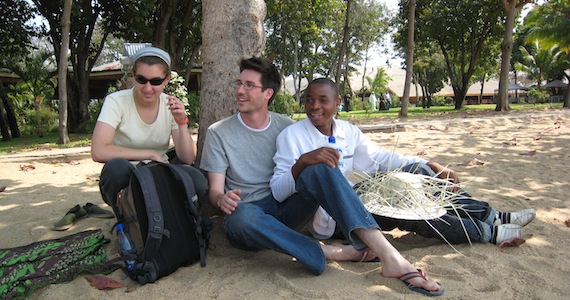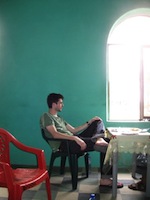Mixed Methods Approach to Global Health

Alexander Radunsky, MPH ’08, is fascinated by the intersection of quantitative methods and qualitative methods. As a doctoral student at the Harvard School of Public Health in the Department of Global Health and Population, Radunsky applies this mixed methods approach to his research on HIV in Africa.
“I’m using mixed methods to try to paint a complete picture of under-researched elements of HIV. The role of subjective experience is an important piece of HIV prevention, transmission and treatment,” says Radunsky, whose current projects examine subjective expectations, including context-specific perception of HIV information in Malawi, the impact of HIV and anti-retroviral therapy on perceived risk of sexual behavior, and time preferences and resource allocation in Kwazulu-Natal, South Africa.
As Radunsky explains, subjective experience, the way people view the world around them, is critical to how they assess their risk and through this mechanism affects their true risk of HIV. “Sexual partner selection, is an example of a health behavior which is likely impacted by public health interventions such as antiretroviral therapy, and this in turn affects population-level transmission risk,” he says.
 Radunsky says his time at the Drexel University School of Public Health gave him skills that he was able to apply to his current work. “I had a fantastic experience at Drexel. The school’s traditional focus emphasizes that public health happens at the community level. I found this to be just as true in the global context as it is in the American context,” he says.
Radunsky says his time at the Drexel University School of Public Health gave him skills that he was able to apply to his current work. “I had a fantastic experience at Drexel. The school’s traditional focus emphasizes that public health happens at the community level. I found this to be just as true in the global context as it is in the American context,” he says.
“One of the strengths of the program is its faculty,” says Radunsky. “My advisor in the program Michael Yudell, as well as others, particularly Augusta Villanueva were incredibly supportive. They took time to mentor me in the program and beyond. Their intellectual and personal support and advice has been hugely valuable.”
His Community-Based Master’s Project (CBMP) also led to his first trip to Africa. Radunsky’s CBMP was with the research group Malawi Diffusion and Ideational
Change Project (MDICP), which is run by Dr. Hans Peter Kohler at the University of Pennsylvania in their Demography department. Upon his graduation from Drexel, he went to Malawi for the project.
He credits the hands-on experience during his CBMP and in Malawi with helping him land his first job. “Another great aspect of my instruction at Drexel was the degree to which it was practically oriented. For my CBMP project, I had to manage real data and it was messy. I had to learn how to wade through it to piece together the complicated realities impacting people’s health in the developing world. That was valuable to me especially on the job market. It helped me get my first job out of school,” he says.
That job was with the Millennium Villages project at Columbia University—a development and research project that is based in a dozen sites in ten countries in Africa—before starting his doctoral degree at Harvard.
As for his post-Harvard plans, Radunsky hopes to continue to work on global health research and practice. “It is easy for academics to forget the potentially life-saving nature of our work if we let ourselves get stuck in our own world. It is in connecting to policy makers and the creation of policy that our work becomes critical to the health and quality of life of people throughout the world. My long-term professional goal is to be a producer of policy relevant research, but also to bridge the important gap between rigorous research and the creation of evidence based, high-quality policy.”